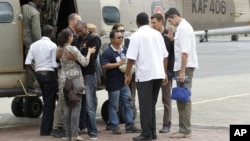Four international aid workers kidnapped in Kenya are now free and headed home, following a dramatic rescue by security forces inside Somalia.
The hostages were rescued on Monday during a joint operation by Kenyan and Somali military forces, three days after being captured.
A Somali police official said the four were discovered after a gunfight between the captors and security officials about 80 kilometers from the Kenya border.
Major Adam Bahdoon Ibraahim said officials got a tip late Sunday that led them to the kidnappers between Dhobley and Buale early Monday.
"We traced the kidnappers into a forest on the side of the road at around 4 a.m.," he said. "We exchanged fire, one of them was killed, the rest fled. We found the four hostages tied hands and legs under a tree. Two females and two men. One man from Philippines had a gunshot wound to his thigh, which he said he sustained during the kidnapping."
The Dhobley police commander said the aid workers appeared bruised and very tired. They include nationals from Norway, Canada, Pakistan and the Philippines.
The aid workers were kidnapped on Friday in the massive Dadaab refugee complex in Kenya. The aid workers' driver, a Kenyan, was killed.
Officials with the Norwegian Refugee Council confirmed the release of its workers, saying they are "deeply thankful."
The council said the workers were being safely returned home, but did not offer details about their medical condition.
Kenyan officials have not said who was behind the kidnappings. They have blamed similar incidents on the Somali-base militant group al-Shabab.
Kenya sent military troops into Somalia in October to pursue members of the al-Qaida-allied group.
Since then, Kenyan officials have blamed a spate of attacks and kidnappings in al-Shabab.
On Sunday, Kenyan police say gunmen attacked two churches in the eastern town of Garissa, killing 17 people and wounding at least 40. There has been no claim of responsibility.
Al-Shabab is considered a regional threat and has been fighting to overthrow Somalia's government and impose a strict form of Sharia, or Islamic law.





